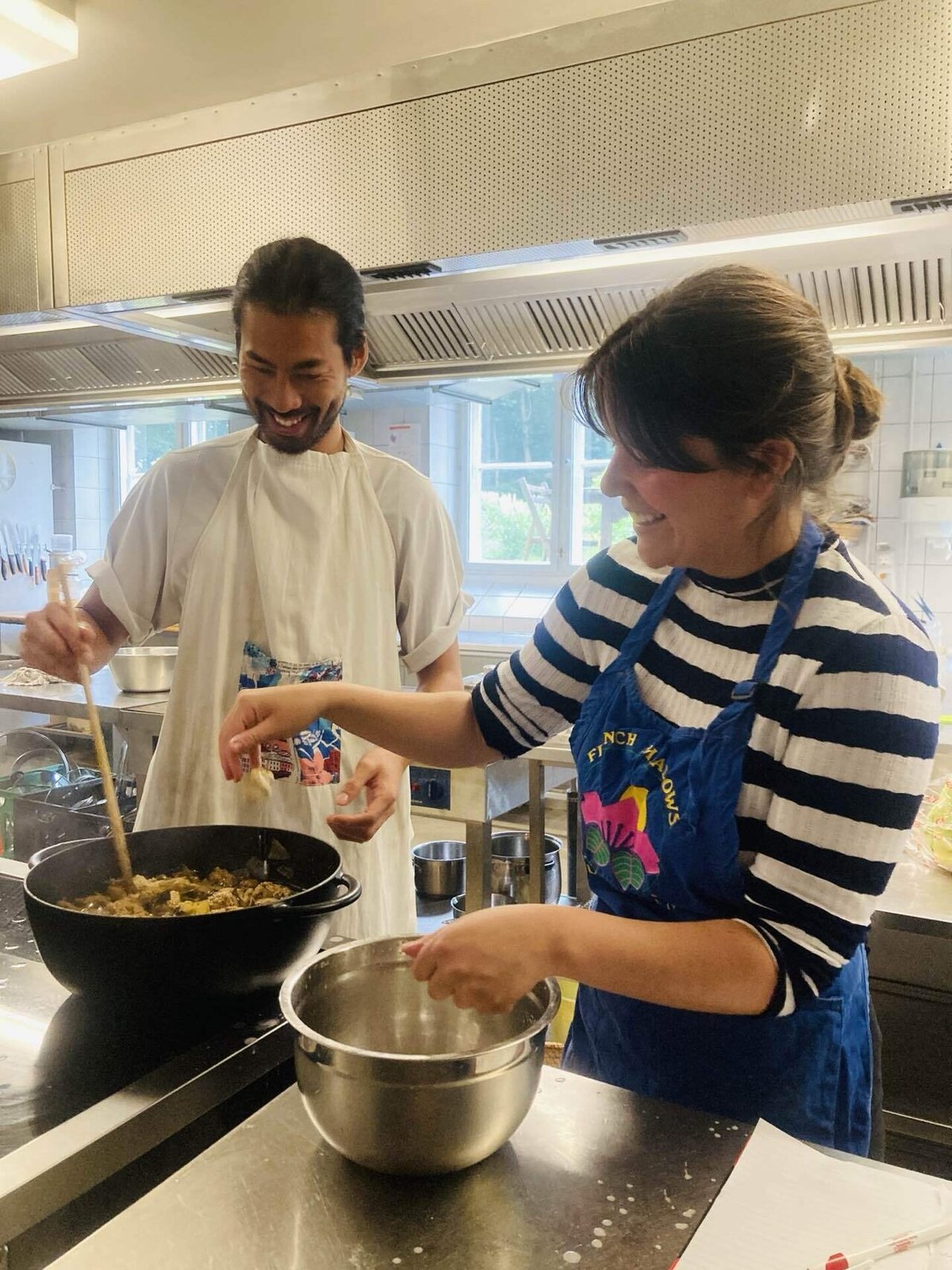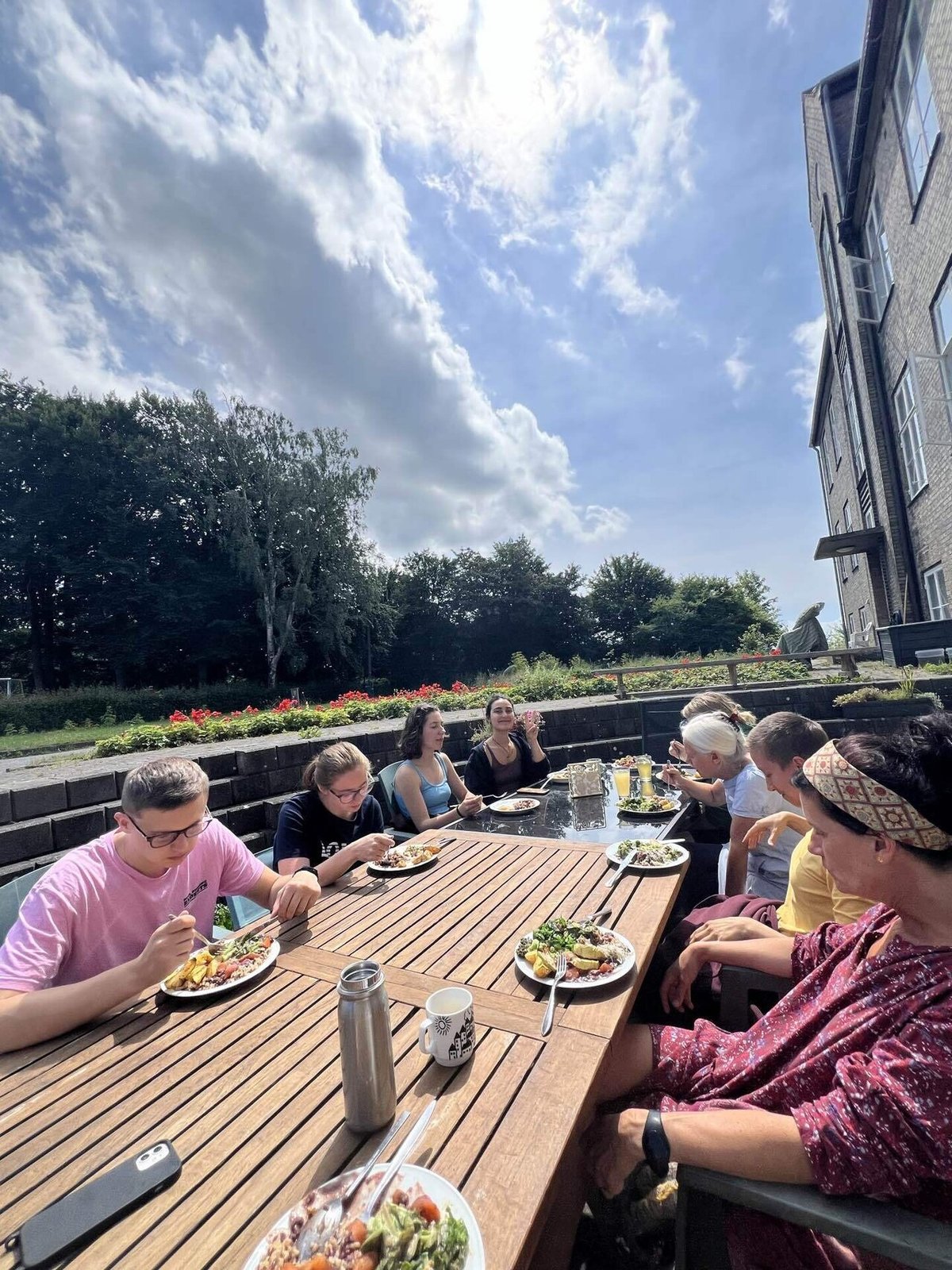
フォルケホイスコーレでの学びと体験。(Learning and Experiencing in højskole)
昔からとても興味があった「Folkehøjskole」に行ってきました。
そこで学んだこと、体験したことを記録として残したく、またより多くの人に知ってもらいたく、まとめてみました。
まず、Folkehøjskoleとは?
フォルケホイスコーレとは、北欧独自の教育機関です。
フォルケホイスコーレの特徴は、試験や成績が一切ないこと、民主主義的思考を育てる場であること、知の欲求を満たす場であることです。
加えて、全寮制となっており、全員が共に生活することなども代表的なフォルケホイスコーレの文化です。教員も各校数人は敷地の中に自宅があります。生徒はみな国籍関係なく国からの助成金を受けることができ、学費の一部を払うだけで入学できます。
もともとフォルケホイスコーレは、哲学者であり教育者でもあるデンマーク人のグルントヴィが「すべての人に教育を」というコンセプトのもと、主に学校に通えない農家に育った人などを対象に創設しました。
やがてもう一人の創始者と言われるクリステン・コルがフォルケホイスコーレを今の民主主義的教育メソッドに変えたと言われています。
1844年に最初のフォルケホイスコーレが開校しました。20年後、64年のシュレースヴィヒ=ホルシュタイン戦争に敗れたことで市民の間で「知」への欲求が大きく増加し、67年にはおよそ20校が、その50年後には68校がつくられました。その後も学校数は少しずつ増え続けますが、2007年ごろから不況により統廃合が行われ、現在では1918年時点とほぼ同数の70校前後があります。統廃合された結果今残っているものの多くは、特定の分野に特化し個性を持った学校です。特化された分野はアート、スポーツ、哲学、福祉など様々ですが、今でも創始者の目指した知を蓄える場所であることや、
民主主義を育てる場所であることはどの学校も一貫して守られています。
私がここに興味を持ったのも、昔から「北欧は幸福度ランキングが常に上位である」「教育が特徴的である、大人と子どもが一緒に考える仕組みが整っている」そんなことを良く耳にしていたからです。
抽象的ですが、人間、自然、生物、社会など複雑に絡み合っている繋がりや全体性を探求していきたいと想っているなかで、自分自身がその世界を体験しているプロセスにいると思うし、これからも色々体験していきたいなと思っています。
そして今回出逢ったのが、デンマークにある「Avnø Oasis Ecovillage」で、日本に帰ったら、まだ具体的な場所は決まっていませんが、香川県でEco Villageてきな空間を創りたいと思っていて、私の想いやDANROでやっていきたいことがここで体験できるなと思ったからです。
どんな場所かは、上記から詳細がみれるので興味がある人はぜひチェックしてみてください!
〈Vision〉
A world where we compassionately connect to ourselves, each other & the environment.
〈Mission〉
To accelerate the transition that needs to happen in regards to health, work, community and resources, on the personal, cultural and social level, to secure optimal living conditions for ourselves and future generations.
私たち自身、互い、そして環境に思いやりを持ってつながる世界を目指しています。
健康、仕事、コミュニティ、資源に関する必要な移行を、個人、文化、社会のレベルで加速させることで、私たち自身と未来の世代のために最適な生活条件を確保したいと考えています。
※folkehøjskole という言葉は保護用語であり、Avnøはまだこのステータスを申請しておらず、現在 "højskole "であり、国からの補助金は受けていませんが、それ以外は "folkehøjskole "と同じ原則に基づいている。

ここでは、1週間から3ヶ月と幅広く様々なコースがありますが、私がちょうどタイミングよく参加できたのが「Cooking for health and happiness」のコース。
料理は今まで全くしてこなかった人生ですが、カナダでの暮らしで料理を少しずつし始めた過程で、スーパーに行き食材を選ぶことが楽しくなったり、栄養についてより興味を持ちはじめたり、DANROでは毎年DTA(Designed Team Alliance)組織で1年間大切にしたいことを決めているんですが、2024年は「健康第一」と掲げていたり、この出逢いは必然だったんだなと思いつつも、数年前までは全く考えられなかった選択肢を自分で選択していて、面白い人生だなと思っているところです。
では、1週間のコースに参加して、詳しくなって料理ができるようになったかと言われると「NO」ですが(英語での学びにも当たり前だけど苦戦)、このコースはもちろんのこと、同じ想いを持った様々な人たちと共に暮らしという体験は、とても豊かでありかけがいのない思い出になったと思っています。
野菜を切るのはとても上達したと思います。笑

Cooking for health and happinessのコースでは、Macrobiotics(マクロビオティックス)陰 (Yin)陽 (Yang)思想を基盤にした食事法を学び、そこでメニューをみんなで考えて、実際に料理をして、食べるという流れで進んでいきました。
マクロビオティックスを簡単に説明すると、自分の身体を理解した上で、地域や季節に応じた陰性、陽性食品のバランスの取れた食材選び、調理法を工夫をすることが健康維持に重要だと考えており、体と自然の調和を目指した食事法です。
陰 (Yin)は、葉物野菜、植物、果物、コーヒー、アルコールなど、冷たく、拡散し、柔らかいエネルギーを持つものを指し、陽 (Yang) は、根菜類、塩、味噌、魚、卵、肉など、温かく、集中し、固いエネルギーを持つものを指します。
Avnø での食生活でもそうでしたが、穀物や野菜、海藻を中心とした自然の形に近い全粒穀物や未精製の食材を選び、動物性食品はとても少量(実際に1週間で摂取したのはハチミツ、卵数個とエビ)でした。

そして味噌汁は朝食で必ず出て、毎食必ず味噌が何かしらの方法で使われていており、梅や昆布もとても愛用されていたことには驚きもあったし、日本にいた時は当たり前のように感じていたことでもあったので、感謝の
想いも溢れていました。
初めて自分で納豆をつくったことも、初めて納豆の匂いをかぐ、食べる人の反応をみるのも良き体験でした。

どのような食事法をとるのかで「ベジタリアン、ヴィーガン、ペスカタリアン」など色々な呼び方がありますが、ここで学んだのが、「フレスタリアン(Flexitarian)」
基本的には植物ベースの食事を中心にするものの、時々動物性食品も摂取する柔軟な食生活をとる人々をいい、「フレキシブル(柔軟)」と「ベジタリアン」を組み合わせた言葉。
健康や環境への配慮から、肉の消費を減らすことを目指していますが、完全なベジタリアンやヴィーガンのような厳格な制限を設けず、自分のライフスタイルや好みに合わせて、バランスの取れたアプローチをとることをさします。
自分自身も世の中も常に変化し続けている中で、自分の内側外側、環境などを見つめ直し続ける中、今後はどうなるかは分からないけど、今はフレキシブルに陰と陽だったり、光と暗闇だったり、東洋と西洋だったりと統合させていき自分の生き方を反映させていきたいし、それがこの世界のためにより良いものになることを願って活動をしていきたいと思っています。


コース以外での学びや体験も沢山ありました。
フォルケでの特徴でもありますが、クラスから日常生活、様々なプロジェクトにいたるまで、常に対話を大切にしていて、その空間の心理的安全性は非常に高く、本当に居心地の良いものでした。
食事の前にみんなで手を繋いで、感謝の歌を唄う。モーニングサークルでまた歌を唄う、週末の夜にはトーキングスティックを行う、旅立つ人に一人一人から前日にメッセージが送られるなど。たった1週間だったので体験、感じきれてないことはまだまだある思うので、次はぜひロングコースに参加したいなと思う時間でした。
あとは周りの大自然。
これらの多くは言葉では伝えきれない非言語の領域でもあるし、自分の心や身体で体感しないと分からない部分だと思うので、ぜひ行ってみて体験してもらいたいなって思っています。
Avnøでは運営しながら住んでいる人、ボランティアをしている人、コースに参加している人、ゲストとしてきてる人、いろんな形での暮らしがあり、デンマーク、スペイン、フランス、ベルギー、ドイツ、アメリカ、日本、当たり前だけど様々な生き方をしている人たちがいて、やっぱりいつも感じるのは何よりもそこでの一期一会の出逢いがこれからの財産になっていくことが本当に嬉しく幸せなことだなと感じた日々でした。
また世界のどこかで再会できることを願っています。

Avnø、フォルケに興味がある人、話聞きたい人、気軽にコメントや他ソーシャルメディアでのメッセージお待ちしております!
お話ししましょう。
END
-----------------------------------
So, what is Folkehøjskole?
Folkehøjskole is a unique educational institution in Scandinavia. The main features of Folkehøjskole are that there are no exams or grades, it is a place that fosters democratic thinking, and it satisfies the desire for knowledge. Additionally, it is a boarding school where everyone lives together, which is another hallmark of the Folkehøjskole culture. Some teachers even have their residences on campus. Students can receive subsidies from the state regardless of nationality and only need to pay part of the tuition to enroll.
Originally, Folkehøjskole was founded by the Danish philosopher and educator Grundtvig under the concept of "education for all," mainly targeting people from farming backgrounds who could not attend regular schools. Another founder, Christen Kold, is said to have transformed Folkehøjskole into the democratic educational method it is today.
The first Folkehøjskole opened in 1844. After losing the Second Schleswig War in 1864, the citizens’ desire for knowledge greatly increased, and by 1867 there were about 20 schools. Fifty years later, there were 68 schools. The number of schools continued to gradually increase, but due to the recession around 2007, consolidations were carried out, and now there are about 70 schools, roughly the same number as in 1918. As a result of these consolidations, many of the remaining schools have become specialized in specific fields, such as art, sports, philosophy, and welfare. Despite these specializations, all schools consistently maintain their original purpose of fostering knowledge and democracy.
I became interested in Folkehøjskole because I had often heard that "Scandinavia always ranks high in happiness" and "its education system is unique, fostering a structure where adults and children think together." Currently, my goal is to explore the interconnectedness and wholeness of humans, nature, life, and society. I feel like I’m in the process of experiencing this world firsthand and want to continue exploring it.
During my journey, I discovered "Avnø Oasis Ecovillage" in Denmark. I hope to create an eco-village-like space in Kagawa Prefecture when I return to Japan. I felt that what I want to achieve and what I want to do with DANRO could be experienced here.
※The term "folkehøjskole" is a protected term and Avnø has not yet applied for this status as it requires a certain number of students among others. So, they are merely a "højskole" and do not receive subsidies from the state, but apart from that we are based on the same principles as a "folkehøjskole".
For more details, please check the information above if you’re interested!
Vision
A world where we compassionately connect to ourselves, each other, and the environment.
Mission
To accelerate the transition that needs to happen in regards to health, work, community, and resources, on the personal, cultural, and social level, to secure optimal living conditions for ourselves and future generations.
At Avnø Oasis, there are various courses ranging from one week to three months. I participated in the "Cooking for Health and Happiness" course. Although I had never cooked before, I started cooking a bit while living in Canada. I began enjoying selecting ingredients at the supermarket and became more interested in nutrition. At DANRO, we annually decide on something important to focus on through our Designed Team Alliance (DTA), and for 2024, we chose "Health First." This new interest and choice, which I could not have imagined a few years ago, made me realize how fascinating life is.
Did I become proficient in cooking after participating in the week-long course? The answer is "NO," but despite the challenges of learning in English, living and experiencing this course with people who shared similar thoughts was an invaluable and rich experience.
In the "Cooking for Health and Happiness" course, we learned about Macrobiotics, a diet based on the Yin-Yang philosophy. We planned menus together, cooked, and ate. In simple terms, Macrobiotics focuses on understanding your body and selecting balanced foods according to the region and season, aiming for harmony between body and nature.
Yin foods include leafy vegetables, plants, fruits, coffee, and alcohol, which are cool, diffuse, and soft energies. Yang foods include root vegetables, salt, miso, fish, eggs, and meat, which are warm, concentrated, and hard energies. At Avnø, the diet mainly consisted of grains, vegetables, and seaweed, using whole grains and unrefined ingredients, with very little animal products (during the week, we only consumed some honey, a few eggs, and shrimp).
Miso soup was served for breakfast every day, and miso was used in some form at every meal. The use of ume (plum) and kombu (kelp) was also very common. These familiar ingredients from Japan brought a sense of gratitude. Making natto for the first time and seeing the reactions of people encountering its smell and taste for the first time were also memorable experiences.
Different diets have various names like Vegetarian, Vegan, and Pescatarian. Here, I learned about "Flexitarian," a flexible diet that mainly focuses on plant-based foods but occasionally includes animal products. It combines "flexible" and "vegetarian" and aims to reduce meat consumption for health and environmental reasons without strict restrictions like vegetarians or vegans, adapting to one's lifestyle and preferences.
As both I and the world continue to change, I want to keep reflecting on my inner and outer environment. Although I don’t know what the future holds, I wish to live flexibly, integrating Yin and Yang, light and darkness, East and West, and reflect these values in my life, hoping it will contribute positively to the world.
There were many other learnings and experiences outside the course. Folkehøjskole is characterized by its emphasis on dialogue in classes, daily life, and various projects, creating a very high level of psychological safety and comfort. Holding hands and singing songs of gratitude before meals, singing again in the morning circle, having talking stick sessions on weekend nights, and sending messages to those departing the day before—all these practices made the experience rich and memorable, even though I only stayed for a week. I look forward to participating in a longer course next time.
The surrounding nature was also a big part of the experience. Many aspects of this place are beyond words and can only be understood through personal experience. I highly recommend visiting and experiencing it yourself.
At Avnø, people live and work in various capacities—as residents, volunteers, course participants, and guests. People from Denmark, Spain, France, Belgium, Germany, the USA, and Japan were living different lifestyles. The encounters at Avnø are treasured experiences that I am truly grateful for and will cherish as a valuable part of my life. I look forward to meeting these people again somewhere in the world.
If you are interested in Avnø or Folkehøjskole or want to hear more, feel free to leave a comment or message me on social media! Let’s talk.
END
この記事が気に入ったらサポートをしてみませんか?
